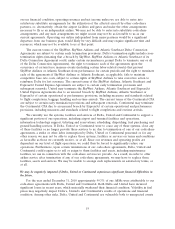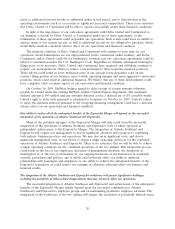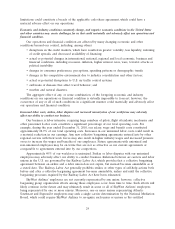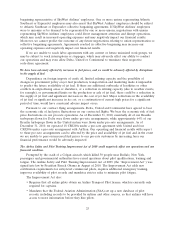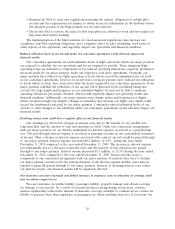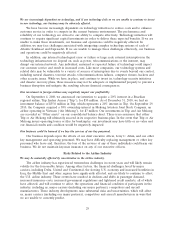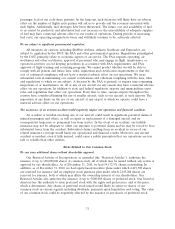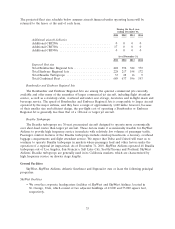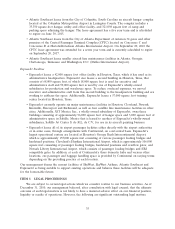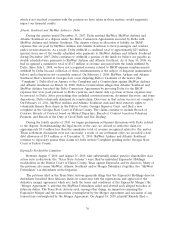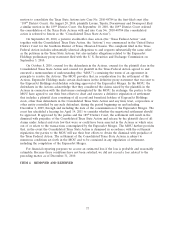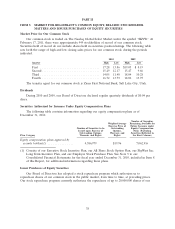SkyWest Airlines 2010 Annual Report Download - page 32
Download and view the complete annual report
Please find page 32 of the 2010 SkyWest Airlines annual report below. You can navigate through the pages in the report by either clicking on the pages listed below, or by using the keyword search tool below to find specific information within the annual report.Maintenance costs will likely continue to increase as the age of our regional jet fleet increases.
Our maintenance costs increased $51.4 million, or 11.8%, during the year ended December 31,
2010, compared to the year ended December 31, 2009. The average age of our CRJ200s and our
ERJ145s is approximately 9.2 years and 9.0 years, respectively. Most of the parts on the CRJ200 and
ERJ145 fleets are no longer under warranty and we have started to incur more heavy airframe
inspections and engine overhauls on those aircraft. Our maintenance costs are expected to continue to
increase on our CRJ200 and ERJ145 fleets. Under our SkyWest Airlines and Atlantic Southeast United
Express Agreements, specific amounts are included in the current rates for future maintenance on
CRJ200 engines used in SkyWest Airlines’ and Atlantic Southeast’s’ United Express operations. The
actual cost of maintenance on CRJ200 engines may vary from the agreed upon rates. During the year
ended December 31, 2010, our CRJ200 engine expense for aircraft operated under our SkyWest
Airlines and Atlantic Southeast United Express Agreements increased $41.5 million as compared to the
year ended December 31, 2009.
Because the average age of our CRJ900s and CRJ700s as of December 31, 2010 was approximately
3.1 and 5.7 years, respectively, our CRJ900 and CRJ700 fleets require less maintenance now than we
anticipate they will require in the future. We have incurred relatively low maintenance expenses on our
CRJ900 and CRJ700 fleets because most of the parts on these aircraft are under multi-year warranties
and a limited number of heavy airframe checks and engine overhauls have occurred. Our maintenance
costs will increase significantly, both on an absolute basis and as a percentage of our operating
expenses, as our fleet ages and these warranties expire. Those increased costs will have a negative
impact on our financial results.
If we incur problems with any of our third-party service providers, our operations could be adversely affected.
Our reliance upon others to provide essential services to support our operations may limit our
ability to control the efficiency and timeliness of contract services. We have entered into agreements
with contractors to provide various facilities and services required for our operations, including fuel
supply and delivery, aircraft maintenance, services and ground facilities, and software and expect to
enter into additional similar agreements in the future. These agreements are generally subject to
termination after notice. Any material problems with the efficiency and timeliness of our automated or
contract services could have a material adverse effect on our business, financial condition and results of
operations.
Interruptions or disruptions in service at one of our hub airports, due to adverse weather or for any other
reason, could have a material adverse impact on our operations.
We currently operate primarily through hubs in Atlanta, Los Angeles, Milwaukee, San Francisco,
Salt Lake City, Chicago, Denver, Cincinnati/Northern Kentucky, Houston, Washington, D.C., Newark,
Cleveland and the Pacific Northwest. Nearly all of our flights either originate from or fly into one of
these hubs. Our revenues depend primarily on our completion of flights and secondarily on service
factors such as timeliness of departure and arrival. Any interruptions or disruptions could, therefore,
severely and adversely affect us. Extreme weather can cause flight disruptions, and during periods of
storms or adverse weather, fog, low temperatures, etc., our flights may be canceled or significantly
delayed. Hurricanes Katrina and Rita, in particular, caused severe disruption to air travel in the
affected areas and adversely affected airlines operating in the region, including Atlantic Southeast. We
operate a significant number of flights to and from airports with particular weather difficulties,
including Atlanta, Salt Lake City, Chicago, Milwaukee and Denver. A significant interruption or
disruption in service at one of our hubs, due to adverse weather or otherwise, could result in the
cancellation or delay of a significant portion of our flights and, as a result, could have a severe adverse
impact on our, operations and financial performance.
28



